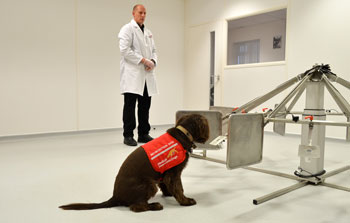 We are delighted to have received ethical approval for the first prostate, kidney and bladder cancer trial in the UK using the olfactory power of dogs. In what will be the largest trial of its kind to date we will use urine samples from 3,000 participants.
We are delighted to have received ethical approval for the first prostate, kidney and bladder cancer trial in the UK using the olfactory power of dogs. In what will be the largest trial of its kind to date we will use urine samples from 3,000 participants.
In training trials our dogs had a 93 per cent reliability rate at detecting prostate cancer in urine samples, which is considerably higher than most comparable tests. Once the trial is completed we hope that screening provided by us could be offered as a second line test to confirm or flag up an inaccuracy in the result of the traditional Prostate-Specific Antigen (PSA) test.
Currently clinicians have only the PSA test result, which measures levels of the protein produced by cells of the prostate gland, to determine whether men go onto the next round of testing. The next stage involves a painful needle biopsy in hospital. Canine screening will provide an invaluable interim test to determine whether invasive treatment is in fact needed.
Prostate cancer is the fourth biggest killer with 41,736 cases and 10,837 deaths recorded in 2011. We want to see more men come forward to get themselves tested rather than to wait to be referred by GP and hope that the easy and painless procedure of collecting a urine sample to be sent to the Medical Detection Dogs centre for screening will encourage men to get themselves tested.
If the trial is successful two national cancer clinics, the Graham Fulford Charitable Trust and the Prostate Cancer Support Group, have expressed an interest in using the cancer service provided by Medical Detection Dogs.
The Graham Fulford Charitable Trust, which has helped carry out over 47,000 PSA blood tests all over the country leading to nearly 900 prostate cancer finds since its inception in 2004, will also be gathering samples for training our dogs. The samples used for the study itself will come from Milton Keynes University Hospital. A total of nine dogs will be used over the course of the research.
Dr Claire Guest, co-founder and director of operations at Medical Detection Dogs, said: “We are delighted this prostate, bladder and kidney cancer trial can finally get underway.
“Prostate cancer is one of the most lethal types of cancer for men. Prostate, lung and bowel cancers together account for over half (53 per cent) of all new cases in males. Bladder and kidney meanwhile accounted for almost 10,000 deaths in 2011.
“Britain has one of the worst rates of early cancer detection in Europe. The NHS needs to be bolder about introducing new innovative methods to detect cancer in its early stages.
“Our dogs have higher rates of reliability than most of the existing tests. We know their sense of smell is extraordinary. They can detect parts per trillion; that’s the equivalent of one drop of blood in two Olympic-sized swimming pools.
“We should not be turning our backs on these highly sensitive bio detectors just because they have furry coats.”
Last month, the Independent NHS England Cancer Taskforce published a report outlining six priorities in cancer care in order to cut the total number of cancer-related deaths by 30,000.
The report outlines the ambition that by 2020, 95 per cent of patients referred for testing by a GP will definitively be tested, and that patients get the result within four weeks.
This will require a significant increase in diagnostic capacity and a quicker adoption of proven innovative methods from clinical trials conducted in the UK, such as canine urine screening.
We have established a reputation since our foundation in 2007 for training dogs to detect cancer. We have published two research papers on bladder cancer and are currently running a trial into the detection of breast cancer using breath samples.
We are a world-leader in this field and advise other smaller clinics in Italy and the US. In September we hosted the first global canine cancer conference in Cambridge attracting scientists from across America, Europe and Asia.
Gary Steele, who was awarded an MBE for his work in prostate cancer awareness campaigning, set up the Prostate Cancer Support Group at Leighton Hospital. Like Graham Fulford, he wants to begin offering canine screening to men who come to the clinic.
Mr Steele commented: “My colleagues and I have been so impressed by the initial investigations by Medical Detection Dogs into prostate cancer screening using dogs.
“The current PSA and Free-to-Total tests are the best we have right now, but they leave a great deal of room for improvement. We need a testing method that is quick, preferably non-invasive and most importantly reliable to encourage men to come and be tested.
“In their training trials, Medical Detection Dogs have achieved 93 per cent reliability and this has been supported by the recent study by Italian scientists who have recorded 98 per cent reliability.
“If they can prove in this study that dogs are reliable at detecting cancer then we will have the evidence we need to offer sample screening by dogs as an optional test in our cancer clinic.
“We should not miss this opportunity to save thousands of lives.”
